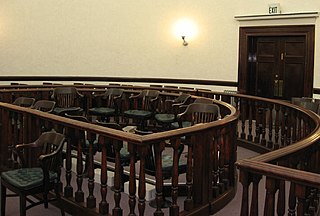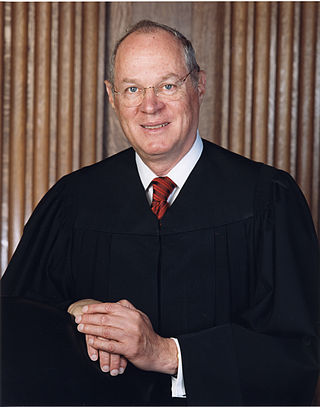Related Research Articles

In the United States, politics functions within a framework of a constitutional federal republic and presidential system, with three distinct branches that share powers: the U.S. Congress which forms the legislative branch, a bicameral legislative body comprising the House of Representatives and the Senate; the executive branch, which is headed by the president of the United States, who serves as the country's head of state and government; and the judicial branch, composed of the Supreme Court and lower federal courts, and which exercises judicial power.

Sandra Day O'Connor was an American attorney, politician, and jurist who served as an associate justice of the Supreme Court of the United States from 1981 to 2006. O'Connor was the first woman to serve as a U.S. Supreme Court justice. She was a moderate conservative. Nominated by President Ronald Reagan, she was considered a swing vote for the Rehnquist Court and the first four months of the Roberts Court. Before O'Connor's tenure on the Court, she was an Arizona state judge and earlier an elected legislator in Arizona, serving as the first female majority leader of a state senate as the Republican leader in the Arizona Senate. Upon her nomination to the Court, O'Connor was confirmed unanimously by the United States Senate.

A jury is a sworn body of people (jurors) convened to hear evidence, make findings of fact, and render an impartial verdict officially submitted to them by a court, or to set a penalty or judgment.

Thoroughgood "Thurgood" Marshall was an American civil rights lawyer and jurist who served as an associate justice of the Supreme Court of the United States from 1967 until 1991. He was the Supreme Court's first African-American justice. Prior to his judicial service, he was an attorney who fought for civil rights, leading the NAACP Legal Defense and Educational Fund. Marshall was a prominent figure in the movement to end racial segregation in American public schools. He won 29 of the 32 civil rights cases he argued before the Supreme Court, culminating in the Court's landmark 1954 decision in Brown v. Board of Education, which rejected the separate but equal doctrine and held segregation in public education to be unconstitutional. President Lyndon B. Johnson appointed Marshall to the Supreme Court in 1967. A staunch liberal, he frequently dissented as the Court became increasingly conservative.
Grutter v. Bollinger, 539 U.S. 306 (2003), was a landmark case of the Supreme Court of the United States concerning affirmative action in student admissions. The Court held that a student admissions process that favors "underrepresented minority groups" did not violate the Fourteenth Amendment's Equal Protection Clause so long as it took into account other factors evaluated on an individual basis for every applicant. The decision largely upheld the Court's decision in Regents of the University of California v. Bakke (1978), which allowed race to be a consideration in admissions policy but held racial quotas to be unconstitutional. In Gratz v. Bollinger (2003), a separate case decided on the same day as Grutter, the Court struck down a points-based admissions system that awarded an automatic bonus to the admissions scores of minority applicants.

Lewis Franklin Powell Jr. was an American lawyer and jurist who served as an associate justice of the Supreme Court of the United States from 1972 to 1987.
Forensic psychology is the practice of psychology applied to the law. Forensic psychology is the application of scientific knowledge and methods to help answer legal questions arising in criminal, civil, contractual, or other judicial proceedings. Forensic psychology includes research on various psychology-law topics, such as jury selection, reducing systemic racism in criminal law, eyewitness testimony, evaluating competency to stand trial, or assessing military veterans for service-connected disability compensation. The American Psychological Association's Specialty Guidelines for Forensic Psychologists reference several psychology subdisciplines, such as social, clinical, experimental, counseling, and neuropsychology.
McConnell v. Federal Election Commission, 540 U.S. 93 (2003), is a case in which the United States Supreme Court upheld the constitutionality of most of the Bipartisan Campaign Reform Act (BCRA), often referred to as the McCain–Feingold Act.
Together, legal psychology and forensic psychology form the field more generally recognized as "psychology and law". Following earlier efforts by psychologists to address legal issues, psychology and law became a field of study in the 1960s as part of an effort to enhance justice, though that originating concern has lessened over time. The multidisciplinary American Psychological Association's Division 41, the American Psychology–Law Society, is active with the goal of promoting the contributions of psychology to the understanding of law and legal systems through research, as well as providing education to psychologists in legal issues and providing education to legal personnel on psychological issues. Further, its mandate is to inform the psychological and legal communities and the public at large of current research, educational, and service in the area of psychology and law. There are similar societies in Britain and Europe.
United States v. Virginia, 518 U.S. 515 (1996), is a landmark case in which the Supreme Court of the United States struck down the long-standing male-only admission policy of the Virginia Military Institute (VMI) in a 7–1 decision. Justice Clarence Thomas, whose son was enrolled at the university at the time, recused himself.
McCleskey v. Kemp, 481 U.S. 279 (1987), is a United States Supreme Court case, in which the death sentence of Warren McCleskey for armed robbery and murder was upheld. The Court said the "racially disproportionate impact" in the Georgia death penalty indicated by a comprehensive scientific study was not enough to mitigate a death penalty determination without showing a "racially discriminatory purpose." McCleskey has been described as the "most far-reaching post-Gregg challenge to capital sentencing."
The cultural cognition of risk, sometimes called simply cultural cognition, is the hypothesized tendency to perceive risks and related facts in relation to personal values. Research examining this phenomenon draws on a variety of social science disciplines including psychology, anthropology, political science, sociology, and communications. The stated objectives of this research are both to understand how values shape political conflict over facts and to promote effective deliberative strategies for resolving such conflicts consistent with sound empirical data.
Minority influence, a form of social influence, takes place when a member of a minority group influences the majority to accept the minority's beliefs or behavior. This occurs when a small group or an individual acts as an agent of social change by questioning established societal perceptions, and proposing alternative, original ideas which oppose the existing social norms. There are two types of social influence: majority influence and minority influence. Majority influence refers to the majority trying to produce conformity on the minority, while minority influence is converting the majority to adopt the thinking of the minority group. Unlike other forms of influence, minority influence is often thought of as a more innovative form of social change, because it usually involves a personal shift in private opinion. Examples of minority influence include the civil rights movement in the United States and the anti-apartheid movement in South Africa.

The Sandra Day O'Connor College of Law is the law school at Arizona State University in Phoenix, Arizona. The school is located in the Beus Center for Law and Society on ASU's downtown Phoenix campus. Created in 1965 as the Arizona State University College of Law upon recommendation of the Arizona Board of Regents, with the first classes held in the fall of 1967. The school has held American Bar Association accreditation since 1969 and is a member of the Order of the Coif. The school is also a member of the Association of American Law Schools. In 2006, the law school was renamed in honor of Phoenix resident, Stanford graduate, and retired Supreme Court Justice Sandra Day O'Connor.
Scientific jury selection, often abbreviated SJS, is the use of social science techniques and expertise to choose favorable juries during a criminal or civil trial. Scientific jury selection is used during the jury selection phase of the trial, during which lawyers have the opportunity to question jurors. It almost always entails an expert's assistance in the attorney's use of peremptory challenges—the right to reject a certain number of potential jurors without stating a reason—during jury selection. The practice is currently unique to the American legal system.
Saul Kassin is an American academic, who serves as a professor of psychology at the City University of New York's John Jay College of Criminal Justice and Massachusetts Professor Emeritus of Psychology at Williams College in Williamstown, Massachusetts.

Anthony McLeod Kennedy is an American attorney and jurist who served as an associate justice of the Supreme Court of the United States from 1988 until his retirement in 2018. He was nominated to the court in 1987 by President Ronald Reagan, and sworn in on February 18, 1988. After the retirement of Sandra Day O'Connor in 2006, he was considered the swing vote on many of the Roberts Court's 5–4 decisions.
Citizens United v. Federal Election Commission, 558 U.S. 310 (2010), is a landmark decision of the Supreme Court of the United States regarding campaign finance laws and free speech under the First Amendment to the U.S. Constitution. The court held 5–4 that the freedom of speech clause of the First Amendment prohibits the government from restricting independent expenditures for political campaigns by corporations, nonprofit organizations, labor unions, and other associations.

Andrew David Hurwitz is a senior United States circuit judge of the United States Court of Appeals for the Ninth Circuit. He served as a justice of the Arizona Supreme Court from 2003 to 2012.
Thornburg v. Gingles, 478 U.S. 30 (1986), was a United States Supreme Court case in which a unanimous Court found that "the legacy of official discrimination ... acted in concert with the multimember districting scheme to impair the ability of "cohesive groups of black voters to participate equally in the political process and to elect candidates of their choice." The ruling resulted in the invalidation of districts in the North Carolina General Assembly and led to more single-member districts in state legislatures.
References
- 1 2 Michael J. Saks Faculty Listing Archived 2008-04-03 at the Wayback Machine Sandra Day O'Connor College of Law
- ↑ Recipient listing APA Award for Distinguished Contribution to Psychology in the Public Interest
- ↑ Faculty Impact Rankings by Area
- ↑ List of works by MJ Saks, Google Scholar
- ↑ Modern Scientific Evidence Archived 2008-01-20 at the Wayback Machine Thompson/West
- ↑ "UVA Law Professor's Book Analyzes How Psychology Influences Evidence Law". University of Virginia School of Law. 2016-11-02. Retrieved 2020-01-20.
- ↑ Forsyth, D.R. (2010) Group Dynamics